Analysis of Option Wireless, Ltd. v. OpenPeak, Inc. - Case Study
VerifiedAdded on 2022/11/25
|7
|1547
|72
Case Study
AI Summary
This case study analyzes the legal dispute between Option Wireless, Ltd. and OpenPeak, Inc., focusing on a contract for wireless data modules. OpenPeak issued a purchase order to Option Wireless, which delivered defective modules. The core issue revolves around the breach of contract, specifically concerning consequential damages. The court considered the Uniform Commercial Code (UCC) and the 'battle of forms' to determine the validity of the contract terms and the liability for damages. The court dismissed OpenPeak's claim for consequential damages, arguing that the seller's invoice did not explicitly make the acceptance conditional. The analysis examines the court's reasoning, the application of UCC Section 2-207, and the implications of the 'expressly made conditional' term, alongside the concept of contract by conduct and the reasons to agree or disagree with the court's decision.
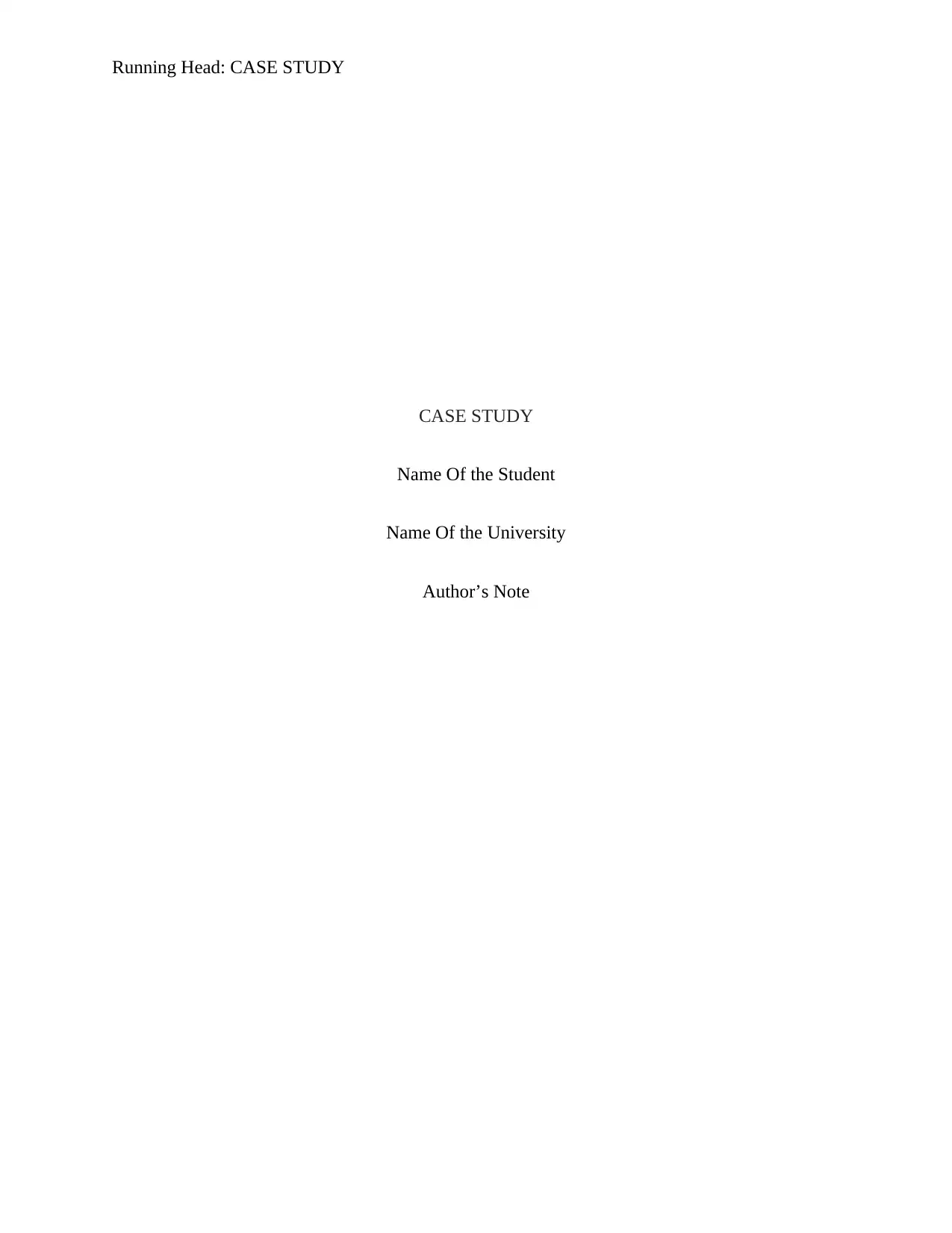
Running Head: CASE STUDY
CASE STUDY
Name Of the Student
Name Of the University
Author’s Note
CASE STUDY
Name Of the Student
Name Of the University
Author’s Note
Paraphrase This Document
Need a fresh take? Get an instant paraphrase of this document with our AI Paraphraser
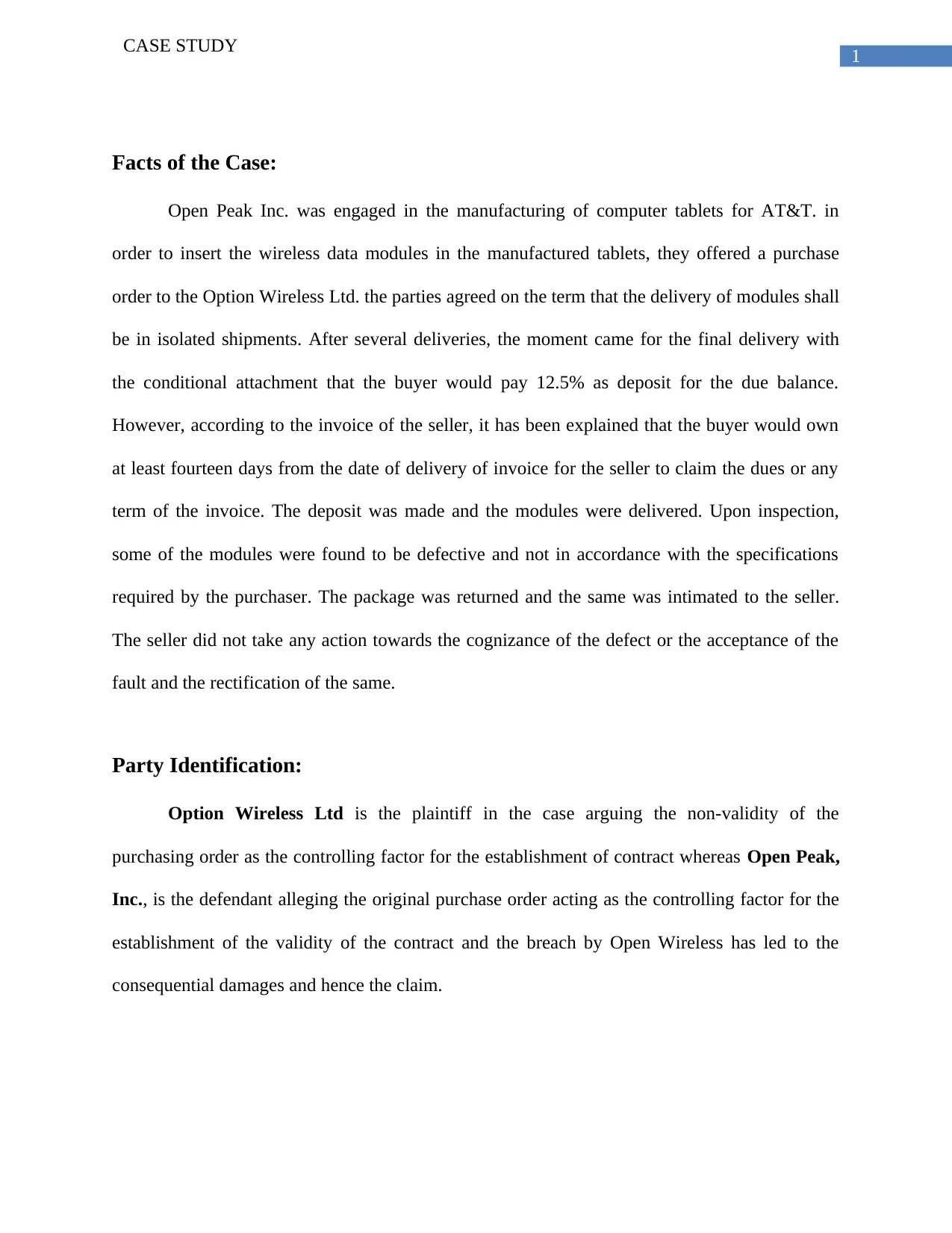
1
CASE STUDY
Facts of the Case:
Open Peak Inc. was engaged in the manufacturing of computer tablets for AT&T. in
order to insert the wireless data modules in the manufactured tablets, they offered a purchase
order to the Option Wireless Ltd. the parties agreed on the term that the delivery of modules shall
be in isolated shipments. After several deliveries, the moment came for the final delivery with
the conditional attachment that the buyer would pay 12.5% as deposit for the due balance.
However, according to the invoice of the seller, it has been explained that the buyer would own
at least fourteen days from the date of delivery of invoice for the seller to claim the dues or any
term of the invoice. The deposit was made and the modules were delivered. Upon inspection,
some of the modules were found to be defective and not in accordance with the specifications
required by the purchaser. The package was returned and the same was intimated to the seller.
The seller did not take any action towards the cognizance of the defect or the acceptance of the
fault and the rectification of the same.
Party Identification:
Option Wireless Ltd is the plaintiff in the case arguing the non-validity of the
purchasing order as the controlling factor for the establishment of contract whereas Open Peak,
Inc., is the defendant alleging the original purchase order acting as the controlling factor for the
establishment of the validity of the contract and the breach by Open Wireless has led to the
consequential damages and hence the claim.
CASE STUDY
Facts of the Case:
Open Peak Inc. was engaged in the manufacturing of computer tablets for AT&T. in
order to insert the wireless data modules in the manufactured tablets, they offered a purchase
order to the Option Wireless Ltd. the parties agreed on the term that the delivery of modules shall
be in isolated shipments. After several deliveries, the moment came for the final delivery with
the conditional attachment that the buyer would pay 12.5% as deposit for the due balance.
However, according to the invoice of the seller, it has been explained that the buyer would own
at least fourteen days from the date of delivery of invoice for the seller to claim the dues or any
term of the invoice. The deposit was made and the modules were delivered. Upon inspection,
some of the modules were found to be defective and not in accordance with the specifications
required by the purchaser. The package was returned and the same was intimated to the seller.
The seller did not take any action towards the cognizance of the defect or the acceptance of the
fault and the rectification of the same.
Party Identification:
Option Wireless Ltd is the plaintiff in the case arguing the non-validity of the
purchasing order as the controlling factor for the establishment of contract whereas Open Peak,
Inc., is the defendant alleging the original purchase order acting as the controlling factor for the
establishment of the validity of the contract and the breach by Open Wireless has led to the
consequential damages and hence the claim.
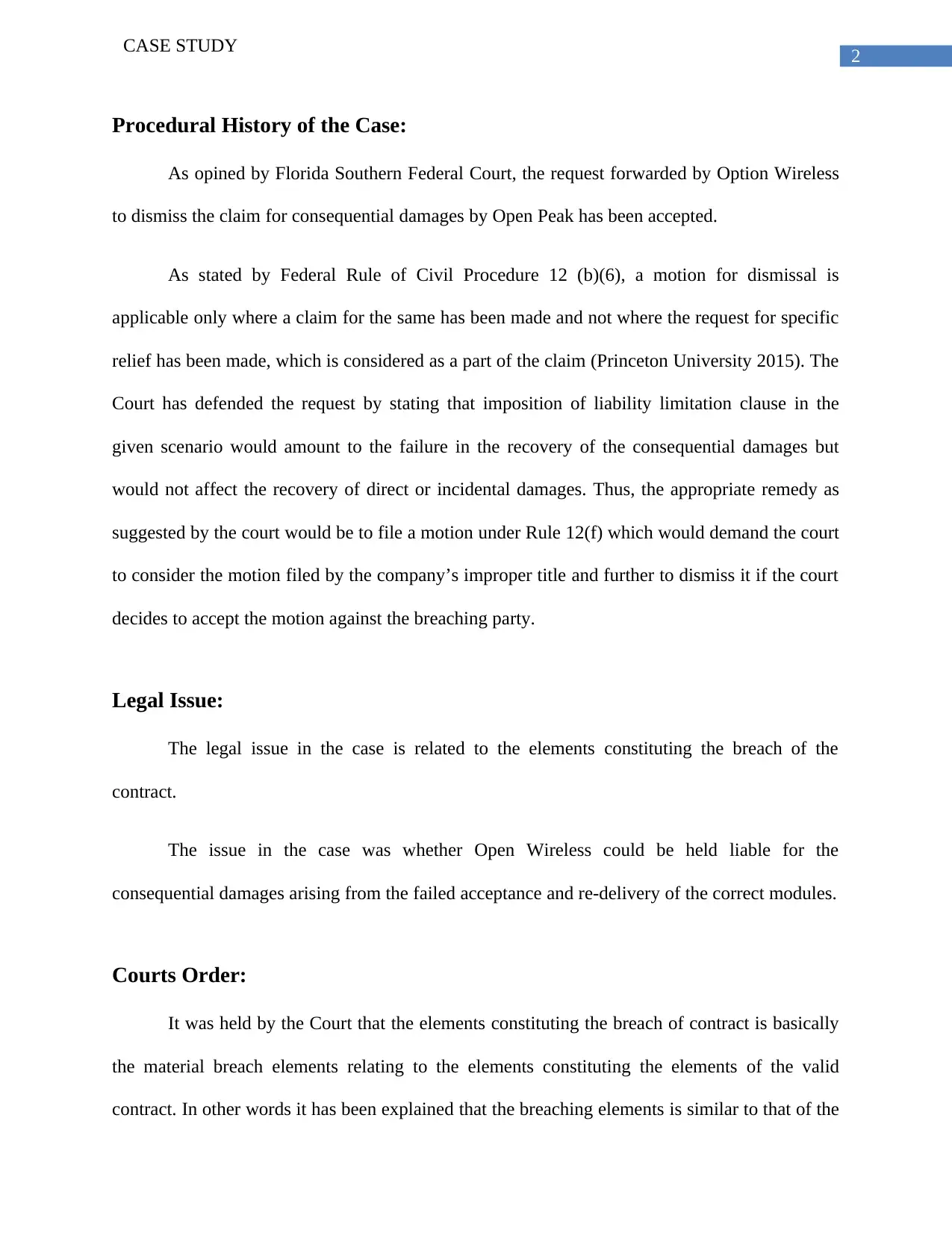
2
CASE STUDY
Procedural History of the Case:
As opined by Florida Southern Federal Court, the request forwarded by Option Wireless
to dismiss the claim for consequential damages by Open Peak has been accepted.
As stated by Federal Rule of Civil Procedure 12 (b)(6), a motion for dismissal is
applicable only where a claim for the same has been made and not where the request for specific
relief has been made, which is considered as a part of the claim (Princeton University 2015). The
Court has defended the request by stating that imposition of liability limitation clause in the
given scenario would amount to the failure in the recovery of the consequential damages but
would not affect the recovery of direct or incidental damages. Thus, the appropriate remedy as
suggested by the court would be to file a motion under Rule 12(f) which would demand the court
to consider the motion filed by the company’s improper title and further to dismiss it if the court
decides to accept the motion against the breaching party.
Legal Issue:
The legal issue in the case is related to the elements constituting the breach of the
contract.
The issue in the case was whether Open Wireless could be held liable for the
consequential damages arising from the failed acceptance and re-delivery of the correct modules.
Courts Order:
It was held by the Court that the elements constituting the breach of contract is basically
the material breach elements relating to the elements constituting the elements of the valid
contract. In other words it has been explained that the breaching elements is similar to that of the
CASE STUDY
Procedural History of the Case:
As opined by Florida Southern Federal Court, the request forwarded by Option Wireless
to dismiss the claim for consequential damages by Open Peak has been accepted.
As stated by Federal Rule of Civil Procedure 12 (b)(6), a motion for dismissal is
applicable only where a claim for the same has been made and not where the request for specific
relief has been made, which is considered as a part of the claim (Princeton University 2015). The
Court has defended the request by stating that imposition of liability limitation clause in the
given scenario would amount to the failure in the recovery of the consequential damages but
would not affect the recovery of direct or incidental damages. Thus, the appropriate remedy as
suggested by the court would be to file a motion under Rule 12(f) which would demand the court
to consider the motion filed by the company’s improper title and further to dismiss it if the court
decides to accept the motion against the breaching party.
Legal Issue:
The legal issue in the case is related to the elements constituting the breach of the
contract.
The issue in the case was whether Open Wireless could be held liable for the
consequential damages arising from the failed acceptance and re-delivery of the correct modules.
Courts Order:
It was held by the Court that the elements constituting the breach of contract is basically
the material breach elements relating to the elements constituting the elements of the valid
contract. In other words it has been explained that the breaching elements is similar to that of the
⊘ This is a preview!⊘
Do you want full access?
Subscribe today to unlock all pages.

Trusted by 1+ million students worldwide
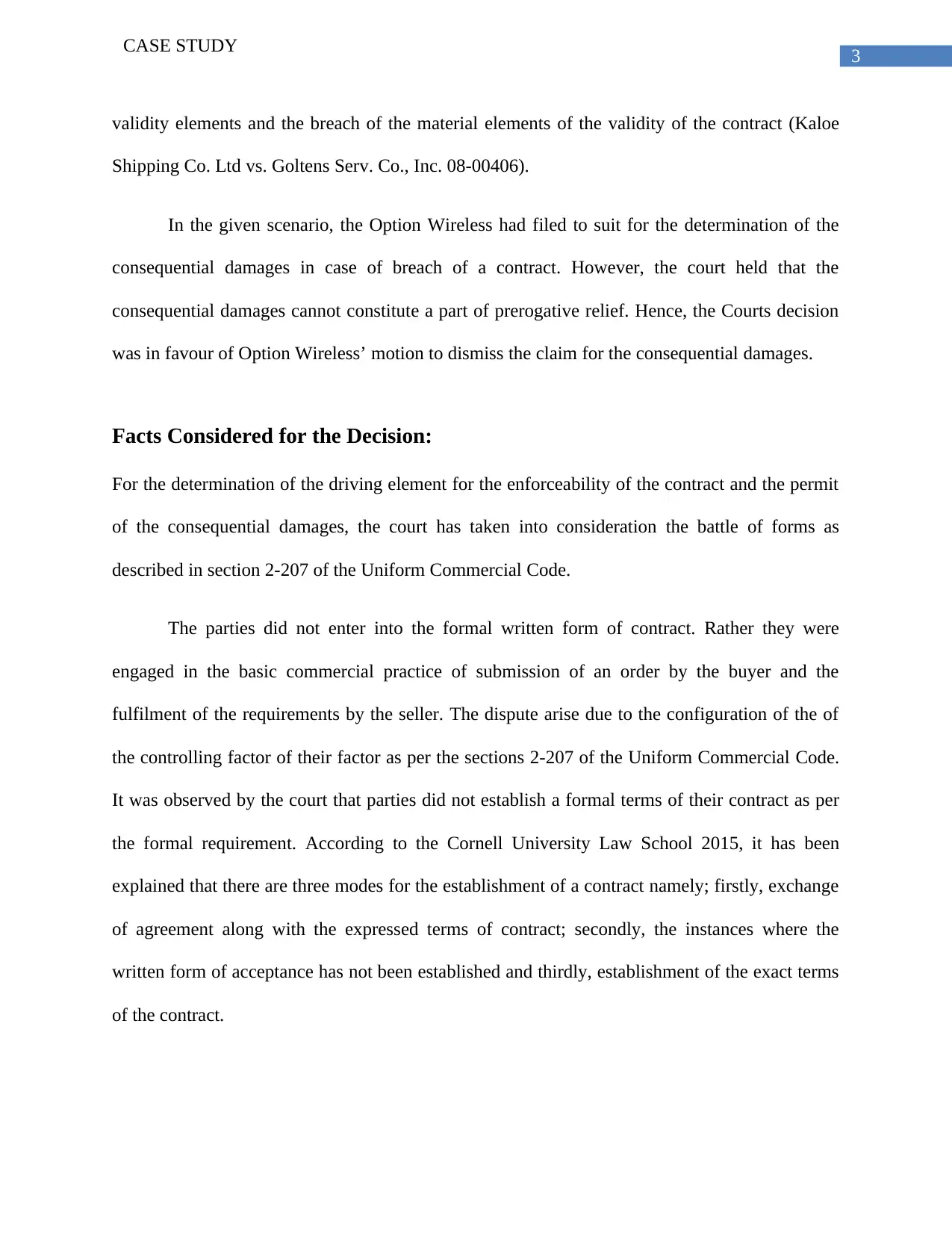
3
CASE STUDY
validity elements and the breach of the material elements of the validity of the contract (Kaloe
Shipping Co. Ltd vs. Goltens Serv. Co., Inc. 08-00406).
In the given scenario, the Option Wireless had filed to suit for the determination of the
consequential damages in case of breach of a contract. However, the court held that the
consequential damages cannot constitute a part of prerogative relief. Hence, the Courts decision
was in favour of Option Wireless’ motion to dismiss the claim for the consequential damages.
Facts Considered for the Decision:
For the determination of the driving element for the enforceability of the contract and the permit
of the consequential damages, the court has taken into consideration the battle of forms as
described in section 2-207 of the Uniform Commercial Code.
The parties did not enter into the formal written form of contract. Rather they were
engaged in the basic commercial practice of submission of an order by the buyer and the
fulfilment of the requirements by the seller. The dispute arise due to the configuration of the of
the controlling factor of their factor as per the sections 2-207 of the Uniform Commercial Code.
It was observed by the court that parties did not establish a formal terms of their contract as per
the formal requirement. According to the Cornell University Law School 2015, it has been
explained that there are three modes for the establishment of a contract namely; firstly, exchange
of agreement along with the expressed terms of contract; secondly, the instances where the
written form of acceptance has not been established and thirdly, establishment of the exact terms
of the contract.
CASE STUDY
validity elements and the breach of the material elements of the validity of the contract (Kaloe
Shipping Co. Ltd vs. Goltens Serv. Co., Inc. 08-00406).
In the given scenario, the Option Wireless had filed to suit for the determination of the
consequential damages in case of breach of a contract. However, the court held that the
consequential damages cannot constitute a part of prerogative relief. Hence, the Courts decision
was in favour of Option Wireless’ motion to dismiss the claim for the consequential damages.
Facts Considered for the Decision:
For the determination of the driving element for the enforceability of the contract and the permit
of the consequential damages, the court has taken into consideration the battle of forms as
described in section 2-207 of the Uniform Commercial Code.
The parties did not enter into the formal written form of contract. Rather they were
engaged in the basic commercial practice of submission of an order by the buyer and the
fulfilment of the requirements by the seller. The dispute arise due to the configuration of the of
the controlling factor of their factor as per the sections 2-207 of the Uniform Commercial Code.
It was observed by the court that parties did not establish a formal terms of their contract as per
the formal requirement. According to the Cornell University Law School 2015, it has been
explained that there are three modes for the establishment of a contract namely; firstly, exchange
of agreement along with the expressed terms of contract; secondly, the instances where the
written form of acceptance has not been established and thirdly, establishment of the exact terms
of the contract.
Paraphrase This Document
Need a fresh take? Get an instant paraphrase of this document with our AI Paraphraser
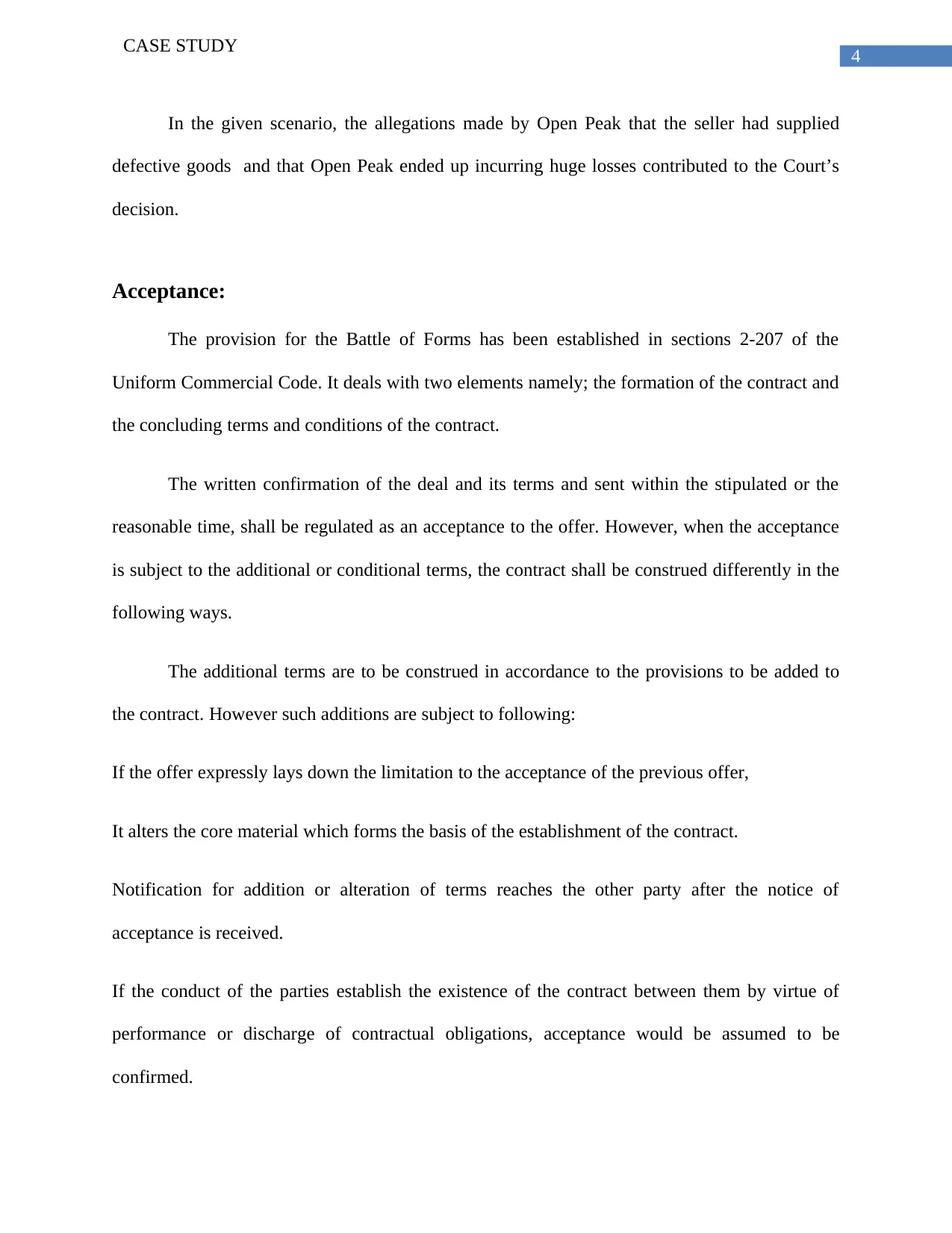
4
CASE STUDY
In the given scenario, the allegations made by Open Peak that the seller had supplied
defective goods and that Open Peak ended up incurring huge losses contributed to the Court’s
decision.
Acceptance:
The provision for the Battle of Forms has been established in sections 2-207 of the
Uniform Commercial Code. It deals with two elements namely; the formation of the contract and
the concluding terms and conditions of the contract.
The written confirmation of the deal and its terms and sent within the stipulated or the
reasonable time, shall be regulated as an acceptance to the offer. However, when the acceptance
is subject to the additional or conditional terms, the contract shall be construed differently in the
following ways.
The additional terms are to be construed in accordance to the provisions to be added to
the contract. However such additions are subject to following:
If the offer expressly lays down the limitation to the acceptance of the previous offer,
It alters the core material which forms the basis of the establishment of the contract.
Notification for addition or alteration of terms reaches the other party after the notice of
acceptance is received.
If the conduct of the parties establish the existence of the contract between them by virtue of
performance or discharge of contractual obligations, acceptance would be assumed to be
confirmed.
CASE STUDY
In the given scenario, the allegations made by Open Peak that the seller had supplied
defective goods and that Open Peak ended up incurring huge losses contributed to the Court’s
decision.
Acceptance:
The provision for the Battle of Forms has been established in sections 2-207 of the
Uniform Commercial Code. It deals with two elements namely; the formation of the contract and
the concluding terms and conditions of the contract.
The written confirmation of the deal and its terms and sent within the stipulated or the
reasonable time, shall be regulated as an acceptance to the offer. However, when the acceptance
is subject to the additional or conditional terms, the contract shall be construed differently in the
following ways.
The additional terms are to be construed in accordance to the provisions to be added to
the contract. However such additions are subject to following:
If the offer expressly lays down the limitation to the acceptance of the previous offer,
It alters the core material which forms the basis of the establishment of the contract.
Notification for addition or alteration of terms reaches the other party after the notice of
acceptance is received.
If the conduct of the parties establish the existence of the contract between them by virtue of
performance or discharge of contractual obligations, acceptance would be assumed to be
confirmed.
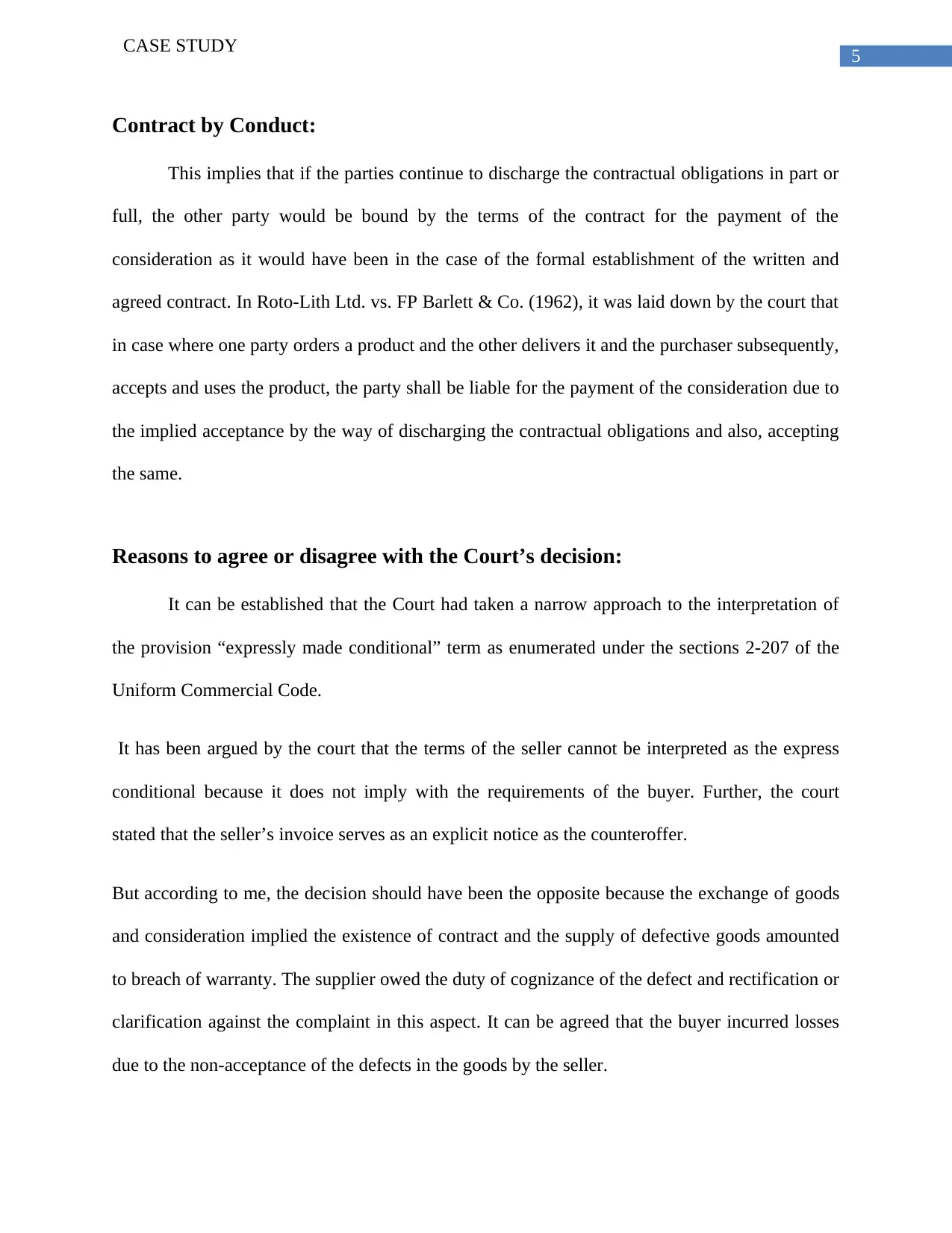
5
CASE STUDY
Contract by Conduct:
This implies that if the parties continue to discharge the contractual obligations in part or
full, the other party would be bound by the terms of the contract for the payment of the
consideration as it would have been in the case of the formal establishment of the written and
agreed contract. In Roto-Lith Ltd. vs. FP Barlett & Co. (1962), it was laid down by the court that
in case where one party orders a product and the other delivers it and the purchaser subsequently,
accepts and uses the product, the party shall be liable for the payment of the consideration due to
the implied acceptance by the way of discharging the contractual obligations and also, accepting
the same.
Reasons to agree or disagree with the Court’s decision:
It can be established that the Court had taken a narrow approach to the interpretation of
the provision “expressly made conditional” term as enumerated under the sections 2-207 of the
Uniform Commercial Code.
It has been argued by the court that the terms of the seller cannot be interpreted as the express
conditional because it does not imply with the requirements of the buyer. Further, the court
stated that the seller’s invoice serves as an explicit notice as the counteroffer.
But according to me, the decision should have been the opposite because the exchange of goods
and consideration implied the existence of contract and the supply of defective goods amounted
to breach of warranty. The supplier owed the duty of cognizance of the defect and rectification or
clarification against the complaint in this aspect. It can be agreed that the buyer incurred losses
due to the non-acceptance of the defects in the goods by the seller.
CASE STUDY
Contract by Conduct:
This implies that if the parties continue to discharge the contractual obligations in part or
full, the other party would be bound by the terms of the contract for the payment of the
consideration as it would have been in the case of the formal establishment of the written and
agreed contract. In Roto-Lith Ltd. vs. FP Barlett & Co. (1962), it was laid down by the court that
in case where one party orders a product and the other delivers it and the purchaser subsequently,
accepts and uses the product, the party shall be liable for the payment of the consideration due to
the implied acceptance by the way of discharging the contractual obligations and also, accepting
the same.
Reasons to agree or disagree with the Court’s decision:
It can be established that the Court had taken a narrow approach to the interpretation of
the provision “expressly made conditional” term as enumerated under the sections 2-207 of the
Uniform Commercial Code.
It has been argued by the court that the terms of the seller cannot be interpreted as the express
conditional because it does not imply with the requirements of the buyer. Further, the court
stated that the seller’s invoice serves as an explicit notice as the counteroffer.
But according to me, the decision should have been the opposite because the exchange of goods
and consideration implied the existence of contract and the supply of defective goods amounted
to breach of warranty. The supplier owed the duty of cognizance of the defect and rectification or
clarification against the complaint in this aspect. It can be agreed that the buyer incurred losses
due to the non-acceptance of the defects in the goods by the seller.
⊘ This is a preview!⊘
Do you want full access?
Subscribe today to unlock all pages.

Trusted by 1+ million students worldwide
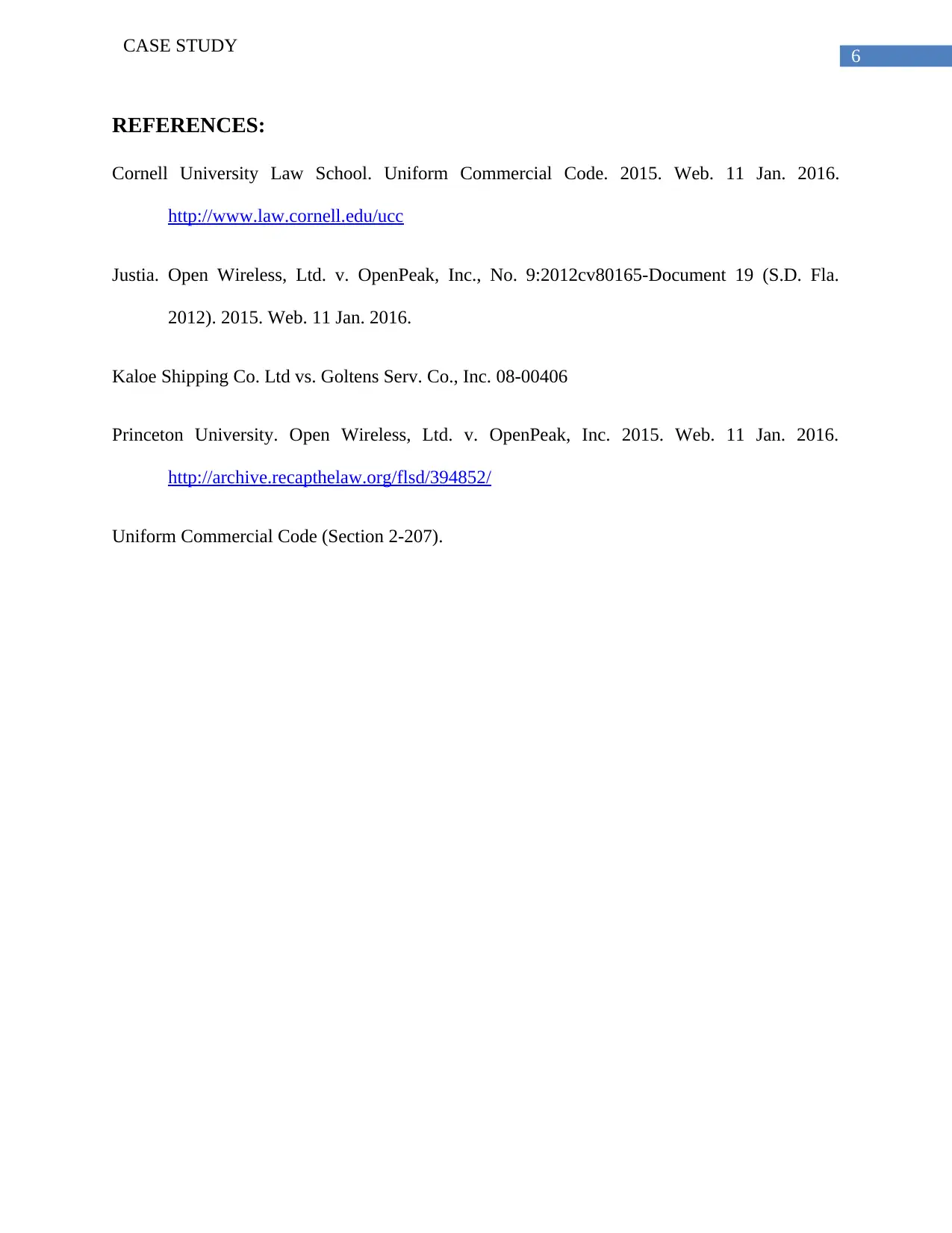
6
CASE STUDY
REFERENCES:
Cornell University Law School. Uniform Commercial Code. 2015. Web. 11 Jan. 2016.
http://www.law.cornell.edu/ucc
Justia. Open Wireless, Ltd. v. OpenPeak, Inc., No. 9:2012cv80165-Document 19 (S.D. Fla.
2012). 2015. Web. 11 Jan. 2016.
Kaloe Shipping Co. Ltd vs. Goltens Serv. Co., Inc. 08-00406
Princeton University. Open Wireless, Ltd. v. OpenPeak, Inc. 2015. Web. 11 Jan. 2016.
http://archive.recapthelaw.org/flsd/394852/
Uniform Commercial Code (Section 2-207).
CASE STUDY
REFERENCES:
Cornell University Law School. Uniform Commercial Code. 2015. Web. 11 Jan. 2016.
http://www.law.cornell.edu/ucc
Justia. Open Wireless, Ltd. v. OpenPeak, Inc., No. 9:2012cv80165-Document 19 (S.D. Fla.
2012). 2015. Web. 11 Jan. 2016.
Kaloe Shipping Co. Ltd vs. Goltens Serv. Co., Inc. 08-00406
Princeton University. Open Wireless, Ltd. v. OpenPeak, Inc. 2015. Web. 11 Jan. 2016.
http://archive.recapthelaw.org/flsd/394852/
Uniform Commercial Code (Section 2-207).
1 out of 7
Related Documents
Your All-in-One AI-Powered Toolkit for Academic Success.
+13062052269
info@desklib.com
Available 24*7 on WhatsApp / Email
![[object Object]](/_next/static/media/star-bottom.7253800d.svg)
Unlock your academic potential
Copyright © 2020–2026 A2Z Services. All Rights Reserved. Developed and managed by ZUCOL.




